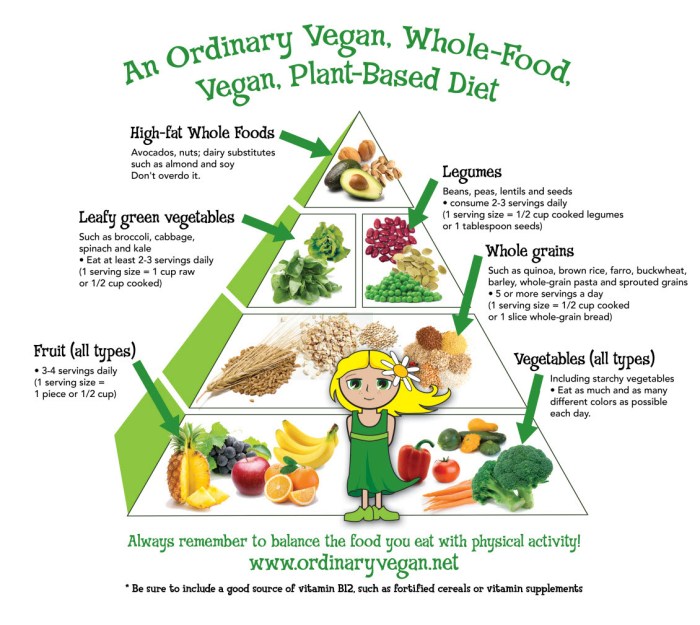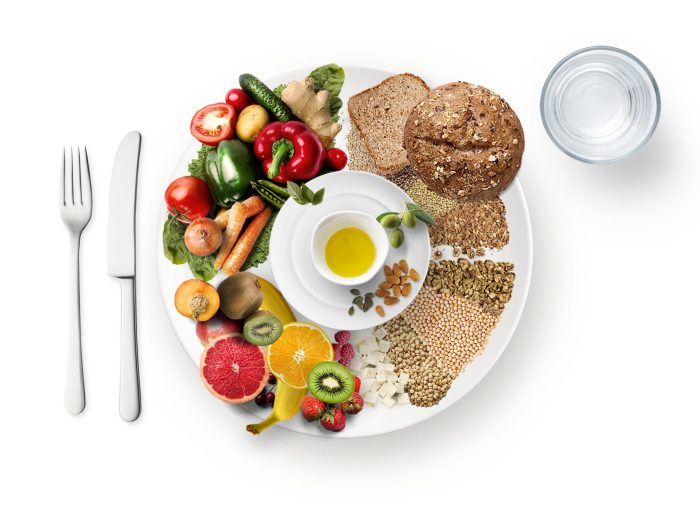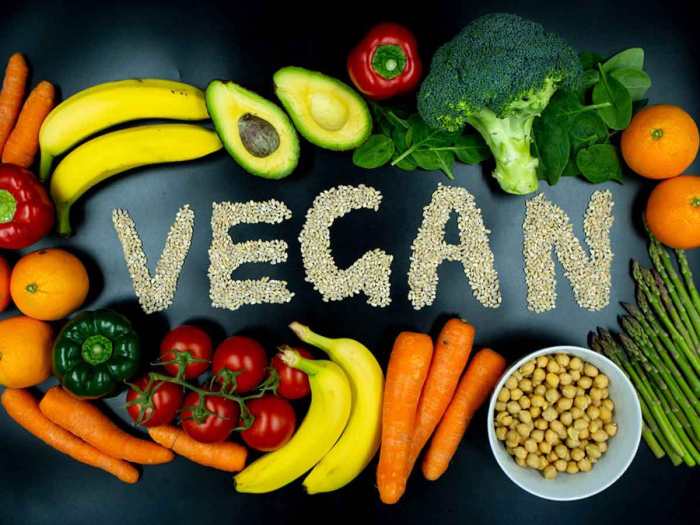How to have a vegan diet – Embark on a transformative journey with our comprehensive guide to a vegan diet. Discover the ethical, environmental, and health benefits that await you as you embrace a plant-based lifestyle.
Delve into the challenges and rewards of a vegan diet, uncovering the secrets to ensuring adequate nutrient intake and finding satisfying alternatives to animal products.
Introduction to Vegan Diet
A vegan diet is a plant-based diet that excludes all animal products, including meat, dairy, eggs, and honey. Vegans adopt this lifestyle for various reasons, primarily due to ethical concerns regarding animal welfare and environmental sustainability.
Ethically, vegans believe that animals should not be exploited or harmed for human consumption. They advocate for the protection of animal rights and the prevention of unnecessary suffering in factory farms and slaughterhouses.
Environmental Impact
Veganism also addresses environmental concerns. Animal agriculture significantly contributes to greenhouse gas emissions, water pollution, and deforestation. By eliminating animal products from their diet, vegans reduce their carbon footprint and promote sustainable land use practices.
Health Benefits of a Vegan Diet

Adopting a vegan diet offers numerous health advantages, supported by scientific research. This plant-based approach has been linked to a reduced risk of various chronic diseases.
Heart Disease
A vegan diet promotes heart health by lowering cholesterol levels and reducing inflammation. Studies have shown that vegans have lower levels of LDL (“bad”) cholesterol and higher levels of HDL (“good”) cholesterol compared to non-vegans.
- A study published in the Journal of the American Heart Association found that vegans had a 24% lower risk of heart disease compared to meat-eaters.
- Another study, published in the American Journal of Clinical Nutrition, showed that a vegan diet was more effective than a low-fat diet in reducing cholesterol levels.
Obesity
Vegan diets are typically high in fiber, which promotes satiety and helps regulate blood sugar levels. This can lead to weight loss and improved weight management.
- A study published in the Journal of the Academy of Nutrition and Dietetics found that vegans had a lower body mass index (BMI) than non-vegans.
- Another study, published in the International Journal of Obesity, showed that a vegan diet was more effective than a calorie-restricted diet in promoting weight loss.
Cancer
Certain types of cancer, such as colon, breast, and prostate cancer, have been linked to the consumption of animal products. A vegan diet, rich in antioxidants and fiber, may help protect against these diseases.
- A study published in the American Journal of Clinical Nutrition found that vegans had a 15% lower risk of colon cancer compared to meat-eaters.
- Another study, published in the Journal of the National Cancer Institute, showed that a vegan diet was associated with a reduced risk of breast cancer in women.
Challenges of a Vegan Diet
Adopting a vegan diet comes with potential challenges that require careful planning and consideration. These challenges primarily revolve around ensuring adequate nutrient intake and finding suitable replacements for animal products.
One of the main challenges is obtaining sufficient protein, which is essential for building and repairing tissues. Plant-based sources of protein, such as beans, lentils, and tofu, need to be consumed in larger quantities to meet the body’s protein requirements.
Vitamin B12 Deficiency
Vitamin B12 is another nutrient that vegans may struggle to obtain. This vitamin is primarily found in animal products, and a deficiency can lead to anemia and neurological problems. To overcome this challenge, vegans should consume fortified foods or supplements to ensure adequate B12 intake.
Omega-3 Fatty Acids
Omega-3 fatty acids, essential for heart and brain health, are predominantly found in fish and seafood. Vegans can obtain omega-3s from plant sources such as flaxseeds, chia seeds, and walnuts, but these sources contain ALA (alpha-linolenic acid), which the body converts less efficiently into the active forms of omega-3s (EPA and DHA).
If you’re considering adopting a vegetarian lifestyle, it’s important to make sure you’re getting all the nutrients you need. A well-planned vegetarian diet list can provide all the essential vitamins, minerals, and protein your body needs. It’s a great way to improve your overall health and well-being.
Therefore, vegans may consider supplementing with algae-based omega-3 supplements.
Calcium and Iron Absorption
Calcium is crucial for bone health, while iron is essential for red blood cell production. While plant-based foods contain these nutrients, they may not be as easily absorbed as those from animal sources. To enhance absorption, vegans should consume calcium-fortified foods, leafy green vegetables, and legumes.
Additionally, consuming vitamin C-rich foods can improve iron absorption.
Social and Cultural Challenges
Beyond nutritional concerns, vegans may also face social and cultural challenges. Dining out or attending social events can be difficult due to limited vegan options. It’s important for vegans to educate themselves about vegan-friendly restaurants and communicate their dietary needs clearly.
Embark on a culinary adventure with a vegetarian diet list that tantalizes your taste buds. Explore a world of vibrant flavors and wholesome ingredients that will leave you feeling satisfied and energized.
Meal Planning for a Vegan Diet: How To Have A Vegan Diet

Meal planning is crucial for a balanced and nutritious vegan diet. It ensures you consume all essential nutrients while avoiding deficiencies.
Consider the following tips when planning vegan meals:
Variety and Balance
- Include a wide range of plant-based foods from all food groups to meet your nutritional needs.
- Choose nutrient-rich foods like fruits, vegetables, whole grains, legumes, and fortified plant-based milk.
Meal Frequency and Portion Control, How to have a vegan diet
- Eat regular meals throughout the day to maintain stable blood sugar levels and prevent overeating.
- Pay attention to portion sizes to ensure adequate calorie intake while avoiding excessive consumption.
Sample Meal Plan
| Meal | Sample Foods |
|---|---|
| Breakfast | Oatmeal with berries, nuts, and plant-based milk; tofu scramble with vegetables |
| Lunch | Lentil soup with whole-wheat bread; salad with grilled tofu, quinoa, and vegetables |
| Dinner | Stir-fry with brown rice, vegetables, and tofu; lentil shepherd’s pie |
| Snacks | Fruit, vegetables, nuts, seeds, hummus |
Supplements and Nutrient Considerations

Vegan diets can be nutritionally adequate, but it is important to be aware of the potential for certain nutrient deficiencies. These include vitamin B12, iron, calcium, and omega-3 fatty acids.
- Vitamin B12:Vitamin B12 is essential for the production of red blood cells and the proper functioning of the nervous system. It is not naturally found in plant foods, so vegans need to get it from fortified foods or supplements.
- Iron:Iron is essential for the production of hemoglobin, which carries oxygen throughout the body. Plant-based sources of iron are not as easily absorbed as animal-based sources, so vegans need to eat iron-rich foods regularly and consider supplementation.
- Calcium:Calcium is essential for strong bones and teeth. Plant-based sources of calcium include fortified plant milks, leafy green vegetables, and tofu. Vegans may also need to consider supplementation to ensure adequate intake.
- Omega-3 fatty acids:Omega-3 fatty acids are essential for heart and brain health. They are found in fatty fish, but vegans can get them from plant-based sources such as flaxseeds, chia seeds, and walnuts.
If you are considering a vegan diet, it is important to talk to your doctor or a registered dietitian to make sure you are getting all the nutrients you need. They can recommend supplements if necessary.
Ethical Implications of a Vegan Diet
The ethical implications of choosing a vegan lifestyle extend beyond personal health and encompass the well-being of animals and the environment. A vegan diet challenges the conventional practices of animal agriculture, which have significant ethical concerns.
Impact on Animal Welfare
Animal agriculture relies heavily on factory farming, a system that confines animals in cramped and unsanitary conditions. This practice raises ethical concerns regarding animal suffering, as animals are subjected to pain, distress, and premature death. A vegan diet eliminates the demand for animal products, thereby reducing the suffering endured by animals in factory farms.
Environmental Sustainability
Animal agriculture contributes significantly to environmental degradation. The production of animal products requires vast amounts of land, water, and energy, and generates greenhouse gases that contribute to climate change. By choosing a vegan diet, individuals can reduce their environmental footprint and promote sustainability.
Compassion and Sustainability
A vegan diet aligns with the ethical principles of compassion and sustainability. It promotes a lifestyle that respects animal rights, minimizes environmental impact, and contributes to a more just and sustainable world.
Conclusive Thoughts
Whether your motivation stems from compassion, health, or sustainability, adopting a vegan diet can empower you to live a more ethical, vibrant, and fulfilling life. Embrace the transformative power of plant-based eating and witness the profound impact it can have on your well-being and the world around you.
Essential Questionnaire
What are the main ethical reasons for adopting a vegan diet?
A vegan diet aligns with ethical values by rejecting the exploitation and suffering of animals in food production.
How can a vegan diet reduce the risk of chronic diseases?
Plant-based diets are rich in fiber, antioxidants, and phytonutrients, which have been linked to a lower risk of heart disease, obesity, and certain types of cancer.
What are some common challenges of a vegan diet?
Ensuring adequate intake of certain nutrients, such as vitamin B12, iron, and calcium, can be a challenge on a vegan diet. However, careful planning and supplementation can address these concerns.
How can I find satisfying alternatives to animal products?
Explore the vast array of plant-based meat, dairy, and egg substitutes available in grocery stores and online. Experiment with tofu, tempeh, lentils, and nuts to create delicious and nutritious vegan meals.